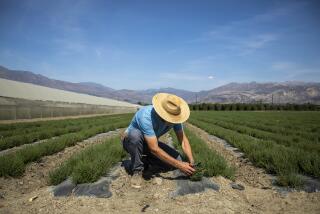Organic Foods’ New Day
- Share via
The food labels that you will begin to see today in supermarkets across the nation, signifying a new national standard for organic foods, could mark the beginning of an era in which organic foods migrate from the fringe to the mainstream.
Dedicated consumers and enterprising farmers have propelled the growth of organic farming in the United States. At a time when every other sector of the food industry is stagnant, organic sales are growing at more than 20% each year.
Americans already purchase about $10 billion in organic foods annually. While that is a small share of the total food market -- and certified organic land still makes up less than 1% of our agricultural space -- consumers who previously hesitated to buy organic foods may be swayed by the new government seal of approval. And with a growing market, even more farmers might consider abandoning their pesticide sprayers and sacks of nitrate in favor of going organic.
Why is this important? Organic farming has the potential to liberate consumers from many of the threats in our food system: meat recalls, the unknown consequences of genetically engineered crops, and agrochemical residues in drinking water.
Instead of depending on the pesticides and fertilizers that now taint our nation’s waterways, organic farmers rely on understanding the ecological processes in the fields: rotating crops to break pest cycles and build the soil, encouraging beneficial insect populations that gobble pests and combining livestock and crop production.
In organic agriculture, farm animals have access to the outdoors instead of being crammed into the warehouse-size metal boxes that now define American meat production and that soil neighboring communities with mountains of manure. The new standard forbids organic farmers from routinely feeding antibiotics or growth hormones to livestock. Last year, studies in the New England Journal of Medicine documented that such routine use in chickens, pigs and cows spurs the growth of resistant bacteria, which undermines the effectiveness of antibiotics for human use.
Consumers of organic food do not have to worry about unlabeled, cloned animals being ground into their meat. Organic processing standards also forbid food irradiation, in addition to a range of preservatives and additives allowed into nonorganic products.
Compared with nations in Europe, where organic farmers enjoy widespread financial and technical support, the United States is lagging. The $180-billion farm bill passed this year included only $15 million for organic farming research and only $5 million to help farmers cover the costs of certification.
But the new labeling standard is a major step toward recognizing that organic farming delivers benefits the public craves: cleaner air and water and a safer food supply.
*
Brian Halweil is research associate at the Worldwatch Institute, an environmental research organization in Washington. Bob Scowcroft is executive director of the Organic Farming Research Foundation in Santa Cruz.






